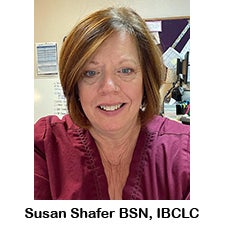
Expecting and new mothers often have many questions about the best ways to breastfeed their newborn, so we asked Natalie Swart BS, IBCLC, CLE and Susan Shafer BSN, IBCLC, international board certified lactation consultants for Lovelace Women’s Hospital, to share some of their answers to these common questions.
Which is better for my baby - formula or breast milk?
 Breastmilk is the best feeding choice for infants because it fills so many of the baby's needs, such as antibodies that help fight off everyday germs, the common cold and even illnesses like childhood leukemia. The World Health Organization and the American Academy of Pediatrics both recommend exclusive breastfeeding for the first six months of life and up to two years and beyond as mutually desired by mother and baby.
Breastmilk is the best feeding choice for infants because it fills so many of the baby's needs, such as antibodies that help fight off everyday germs, the common cold and even illnesses like childhood leukemia. The World Health Organization and the American Academy of Pediatrics both recommend exclusive breastfeeding for the first six months of life and up to two years and beyond as mutually desired by mother and baby.
We also know that breastmilk helps brain development, as most lifelong brain development occurs in the early years of a baby’s life. This early brain and immune development create the foundation for babies that will last their entire lives.
Lovelace Women’s Hospital has achieved international recognition as a Baby-Friendly® designated birth facility by Baby-Friendly USA, Inc®. The initiative encourages and recognizes hospitals and birthing centers that offer an optimal level of care for breastfeeding mothers and their babies. Based on the Ten Steps to Successful Breastfeeding, this award recognizes birth facilities that offer breastfeeding mothers the information, confidence and skills needed to successfully initiate and continue breastfeeding their babies.
What are some of the disadvantages of breastfeeding?
Breastfeeding is a very individual experience, so its advantages and disadvantages are just as individual. It is hard to say who will have difficulties and who won't. The most common concern that mothers come to us with is concerns about working while breastfeeding.
Breastfeeding can be a challenge in today's world where mothers are expected to not only mother, but also generate income. Some families compromise by filling bottles with expressed breastmilk so their babies can continue to receive the many benefits of breastmilk. Your lactation consultant can help you find a plan that works for both of you.
 Should I try to schedule when my baby breastfeeds?
Should I try to schedule when my baby breastfeeds?
Healthy babies at home with their mothers should be the ones who set the pace and timing of their feeds because that comes at an intuitive level. This means your baby will let you know when he or she is hungry or when she has had enough. You should expect 8-10 attempted feeds a day, with some better than others. When we try to time infant feeds, it can be detrimental to the development and maintenance of milk supply. It may not allow her to get everything she needs. It is simply best to let your baby tell you what they need and how often.
Are there any illnesses I can pass along to my baby by breastfeeding?
According to CDC guidelines, mothers with a confirmed or suspected Ebola Virus infection should not breastfeed their infants. According to the CDC, mothers with HSV can continue to breastfeed if no lesions are present. If lesions are present, you should temporarily stop breastfeeding and not feed expressed milk from that breast. For mothers living in the U.S. with HIV, the CDC recommends that you completely avoid breastfeeding.
It is possible for the mother or baby or both to become ill. But the good news is that breastfeeding often lessens the severity of illness and can help with the recovery process as well. Immunities to illnesses you have built-up in your life can be easily shared with your baby by breastfeeding. If you are feeling ill while breastfeeding, feel free to contact your lactation consultant to decide if it is safe to proceed.
What medications should I not take if I am breastfeeding?
Medications and breastfeeding don't always mix. It is best to discuss individual medications and health concerns with your lactation consultant and doctor or midwife to determine what is safest for you and your baby.
For more information on Lovelace lactation services at Lovelace Women’s Hospital, click here to learn more or call (505) 727-6797.
To make an appointment with the lactation servcies office at Lovelace Regional Hospital in Roswell, call (575) 625-3395.




